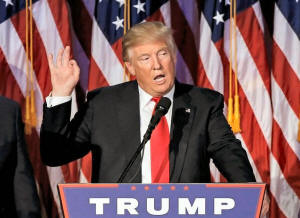|
China, U.S. must avoid excessive mutual
suspicion: Chinese envoy
 Send a link to a friend
Send a link to a friend
 [November 17, 2016]
By David Brunnstrom [November 17, 2016]
By David Brunnstrom
WASHINGTON (Reuters) - China and the United
States must avoid being overly suspicious of each other's strategic
intentions, China's ambassador to the United States said on Wednesday
while looking ahead to the Presidency of Donald Trump.
Trump lambasted China throughout the U.S. election campaign, drumming up
headlines with his pledges to slap 45 percent tariffs on imported
Chinese goods and to label the country a currency manipulator on his
first day in office.
He has also vowed to build up the U.S. Navy in what advisers say will be
a strategy to reassure countries in the Asia-Pacific worried about
China's assertive pursuit of territorial claims.
China's Washington envoy, Cui Tiankai, told a film screening to
commemorate the 1979 normalization of U.S.-China ties that after ďa most
unusual political season,Ē it was important to build consensus and
identify common ground.
He said both countries were already cooperating on many issues, but
added:
"We have to make greater efforts to promote better mutual understanding
and we should be careful not to be overly suspicious about each otherís
strategic intentions.

"There are people here in the United States who believe that everything
that China does is aimed at challenging the United States' s global
dominance, and there are people who believe that everything the U.S. is
doing is aimed at containing China.
"I think both views are wrong."
There would inevitably be problems and challenges in the next four
years, Cui said, "but ... I am quite confident that, on the whole, the
relationship will move forward on a stable and right track."
Cui said the countries had a shared responsibility to cooperate on
issues such as terrorism and proliferation of weapons of mass
destruction.
"We both want stability in the world. We both strive for a stronger
global economy, and we both need a better natural environment. Common
goals call for a close partnership."
[to top of second column] |

President elect Donald Trump speaks at election night rally in
Manhattan, New York, U.S., November 9, 2016. REUTERS/Mike Segar/File
Photo

Trump and Chinese President Xi Jinping spoke by phone on Monday and
Xi told the U.S. President-elect cooperation was the only choice for
the world's two largest economies, while Trump said they had
established a "clear sense of mutual respect."
Nevertheless, Trump's election has created uncertainty when Beijing
hopes for stability as it faces daunting reform challenges at home,
slowing growth and a leadership reshuffle that will assemble a new
party elite around Xi in late 2017.
Zbigniew Brzezinski, who as U.S. National Security Adviser drove
normalization with China in the late 1970s told the same Washington
event the world was watching U.S. political developments "with some
stupefaction."
"We are now living in a political system, a worldwide system, that
is experiencing a very serious crisis... . (I)t is potentially
threatening to both sides, to the well-being of global stability,"
he said.
"You can have serious political problems in China Ö there are
serious problems in the United States. We donít know how we will be
managing responsibilities in the foreseeable future, given some of
the initial warning signals," Brzezinski said.
(Reporting by David Brunnstrom; Editing by Simon Cameron-Moore)
[© 2016 Thomson Reuters. All rights
reserved.]
Copyright 2016 Reuters. All rights reserved. This material may not be published,
broadcast, rewritten or redistributed.
 |